Charles E W Bean, Diaries, AWM38 3DRL 606/252/1 - 1918 - 1935 - Part 13



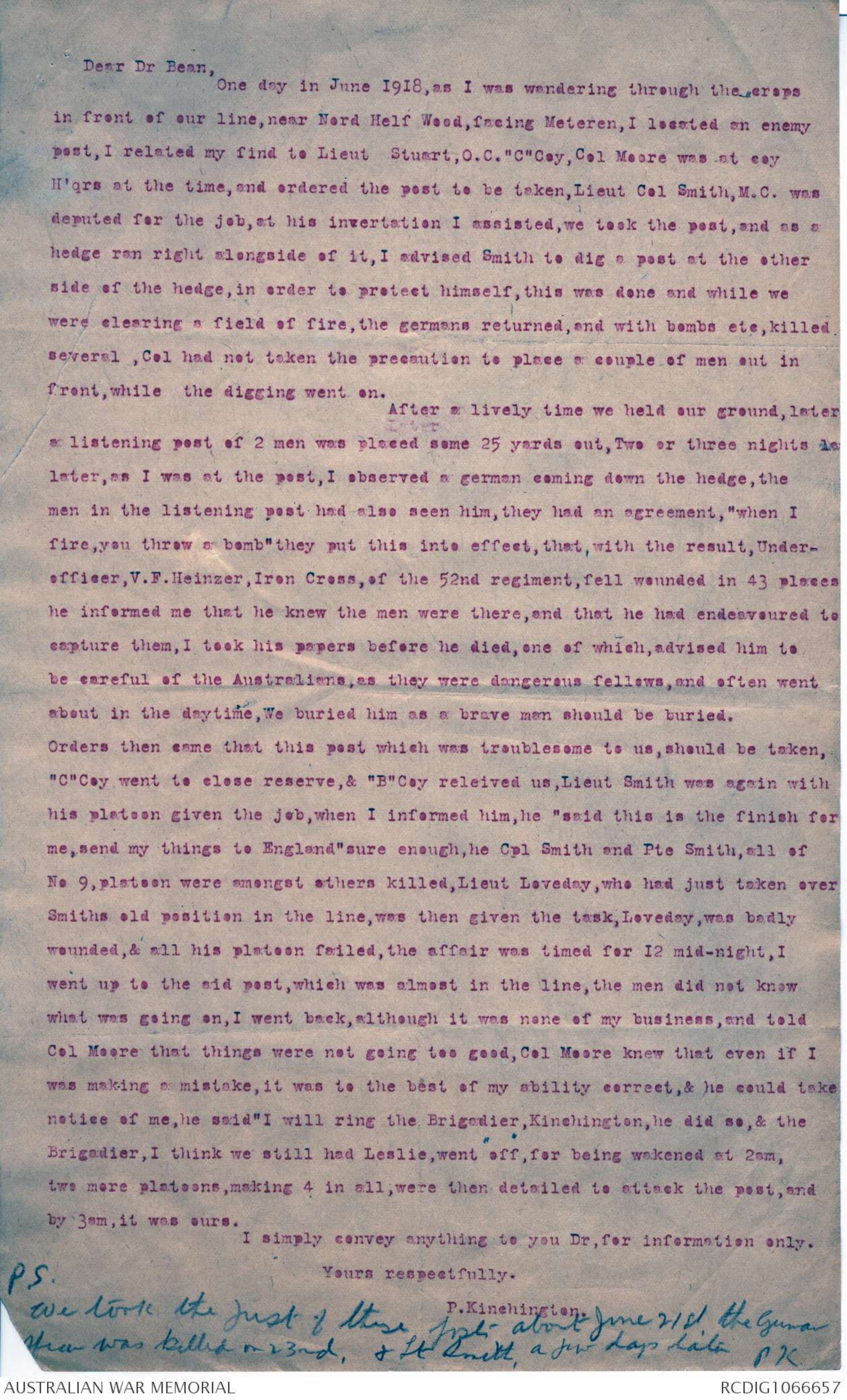
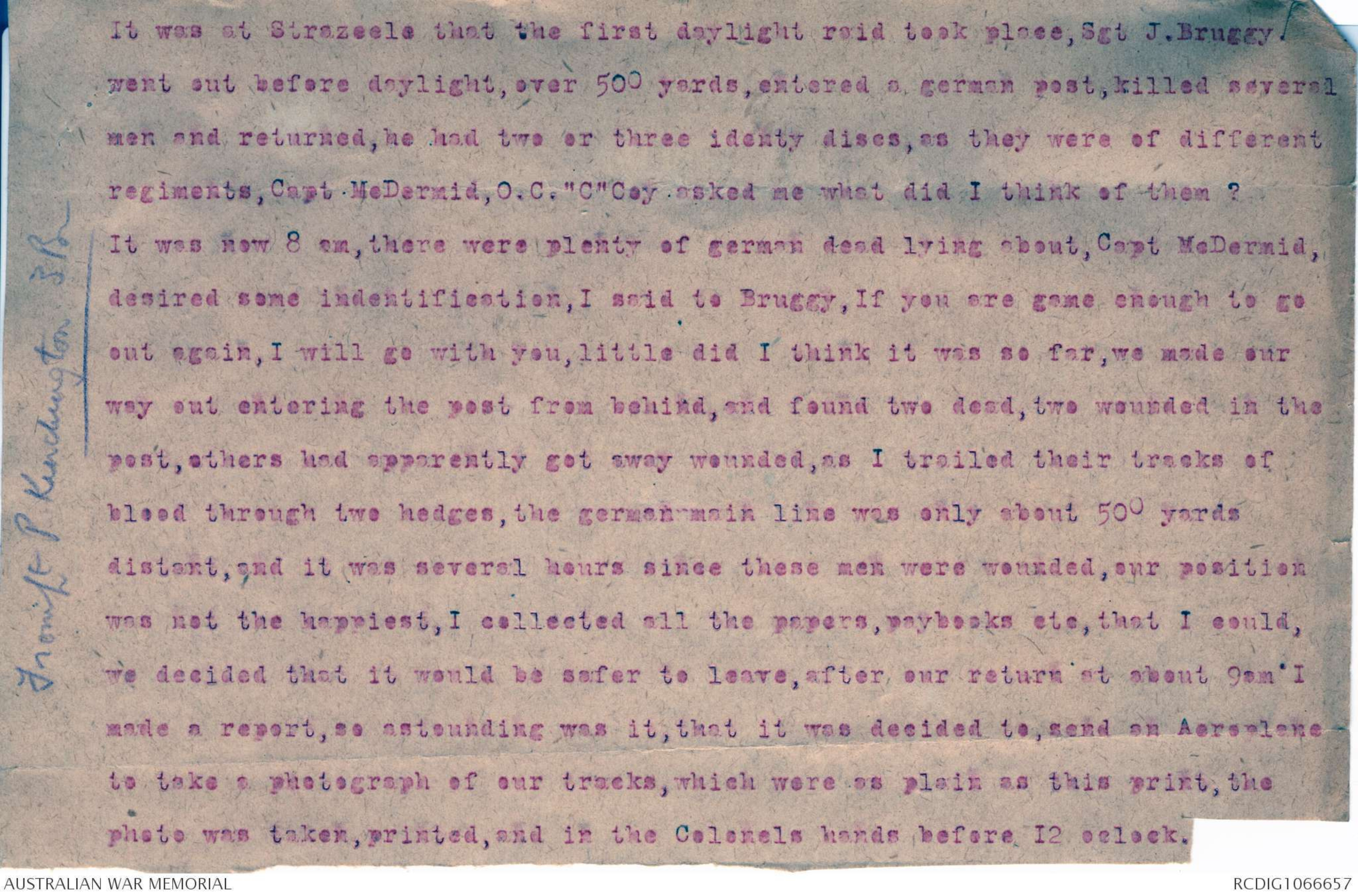
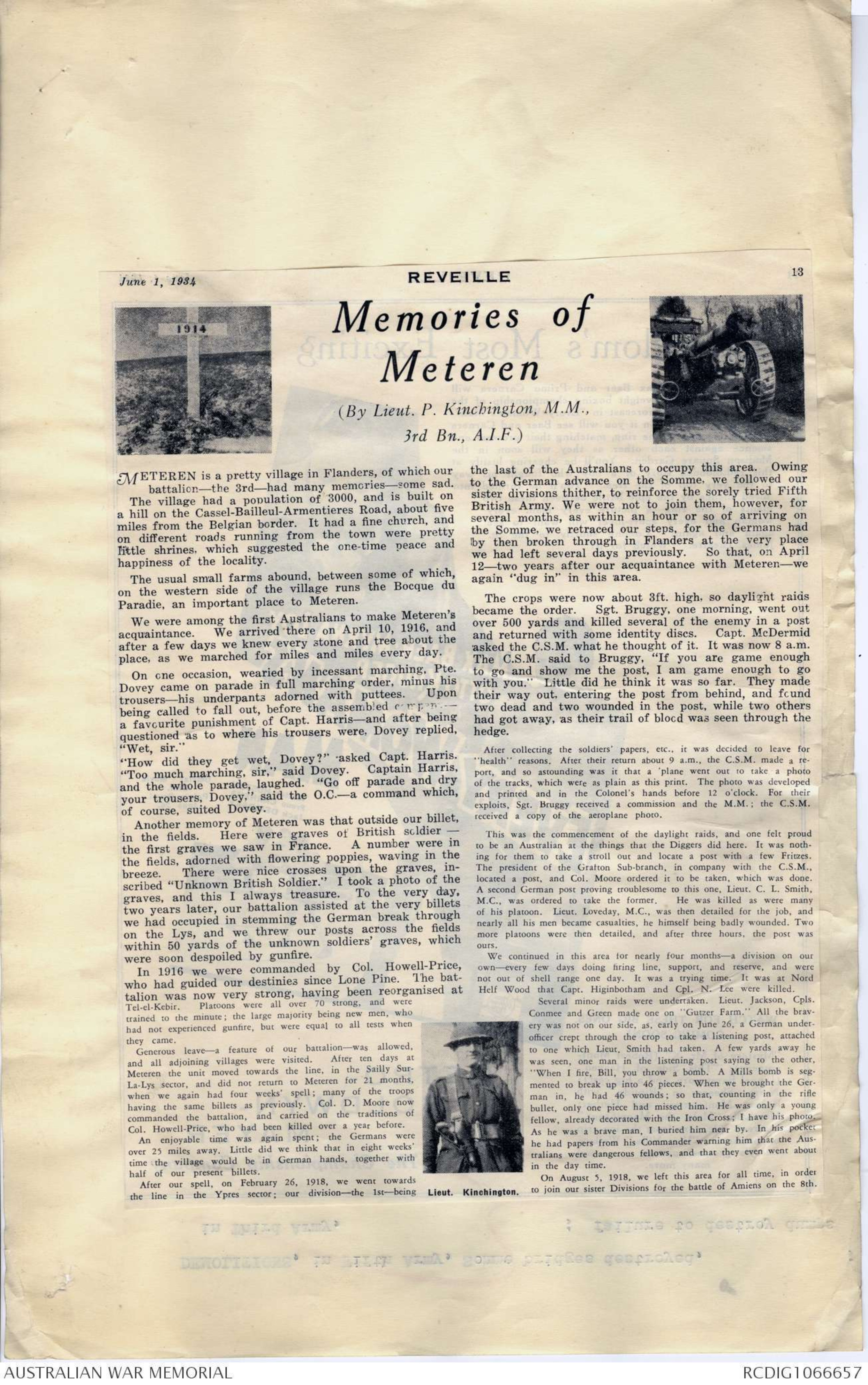
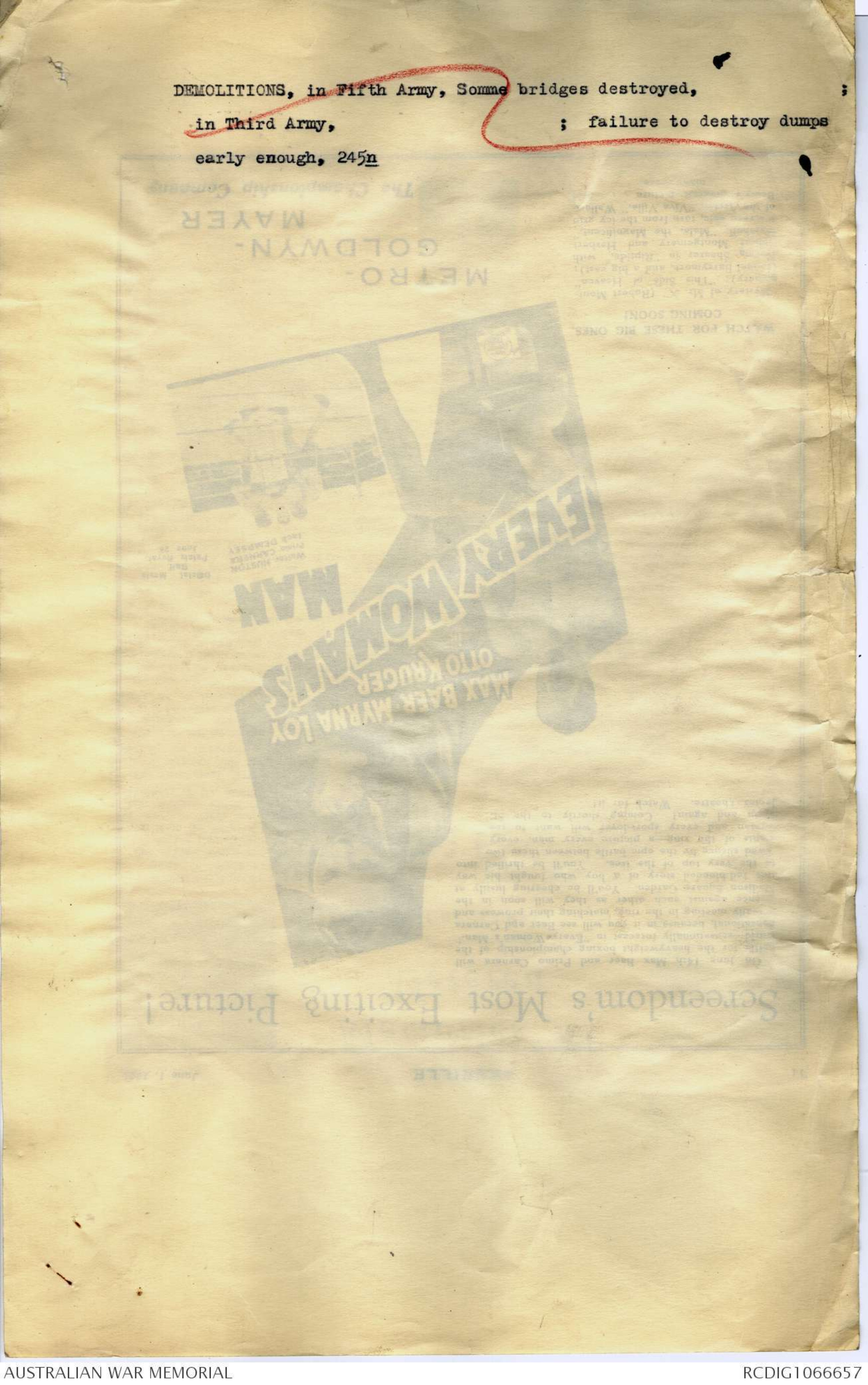
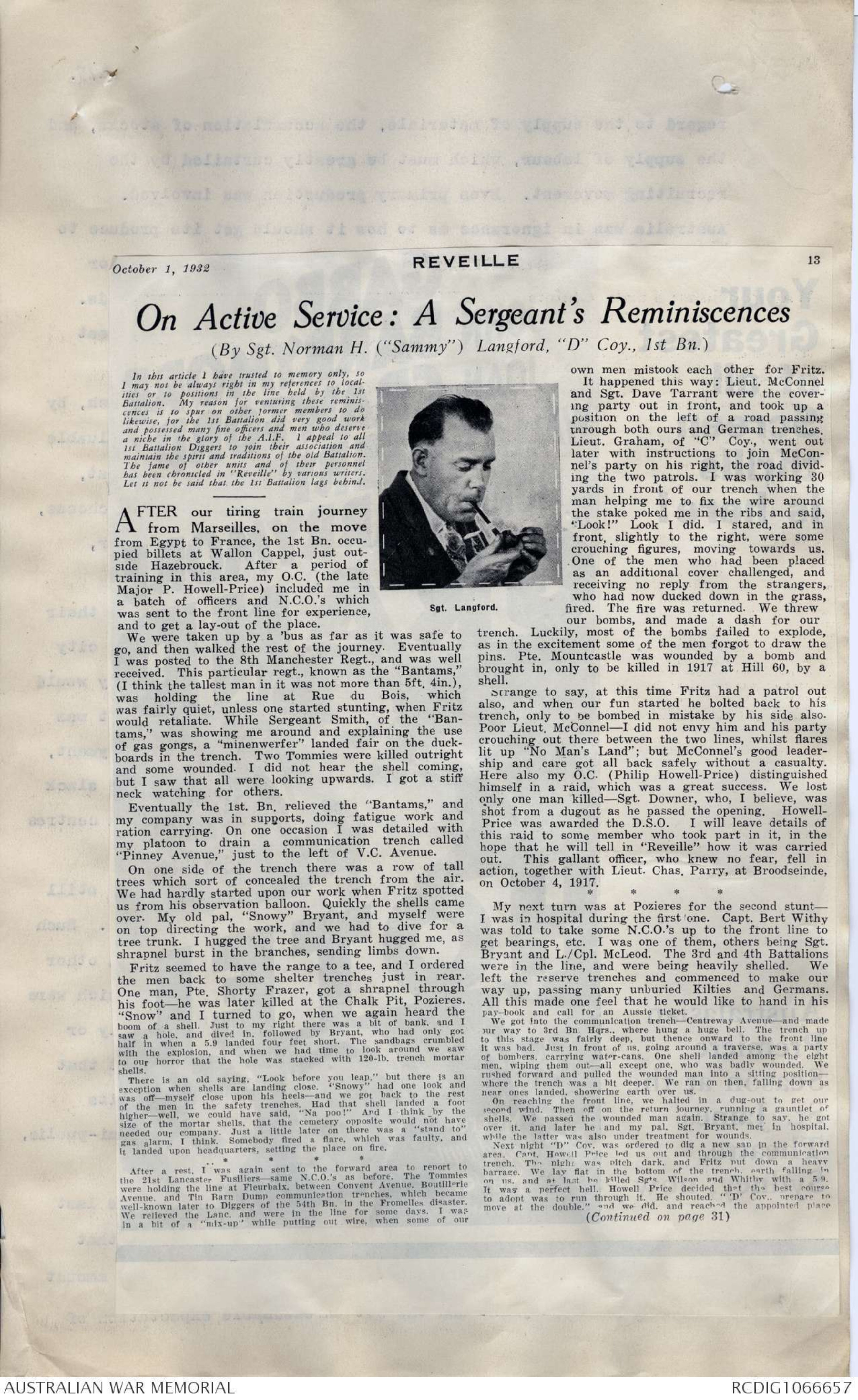
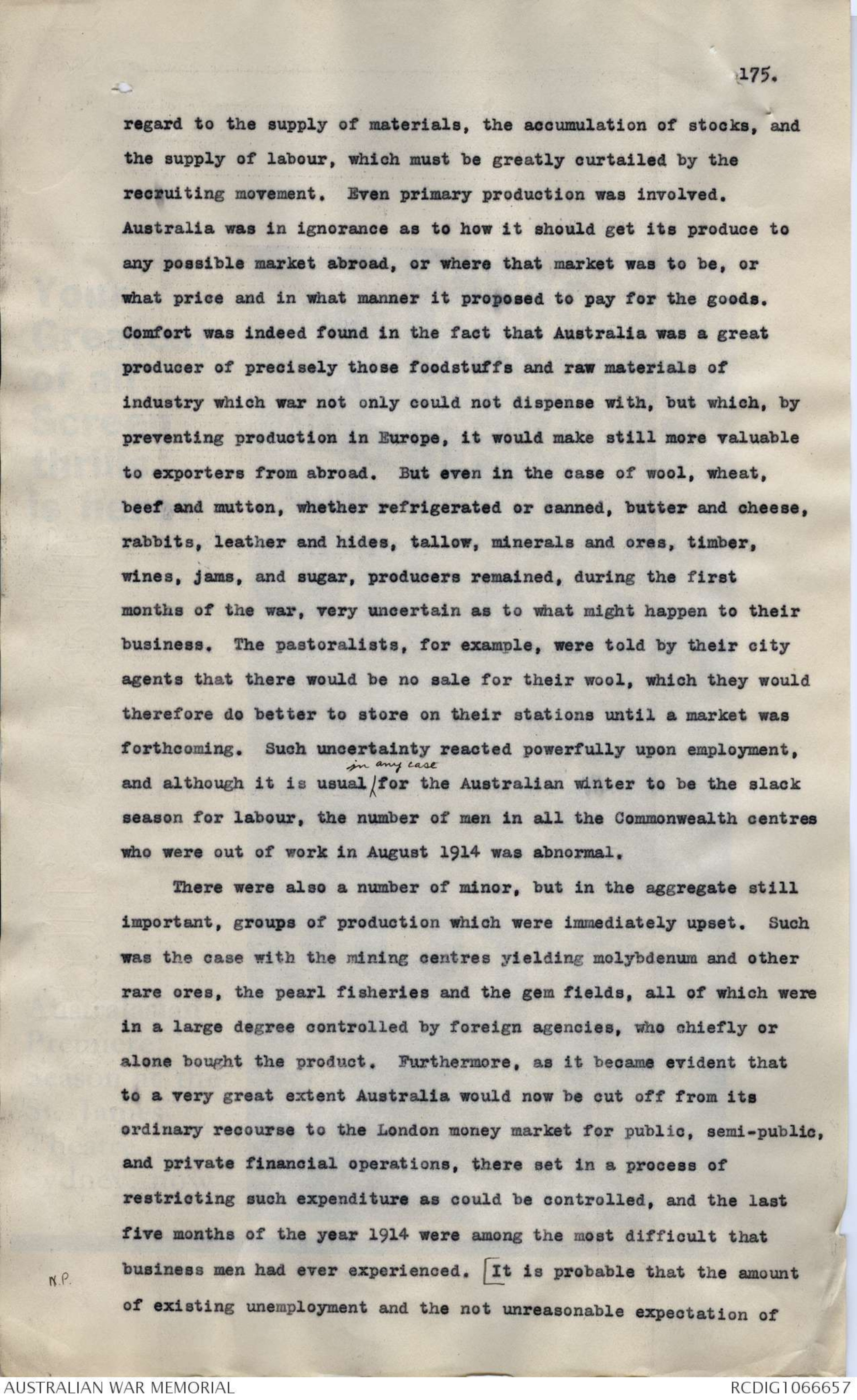
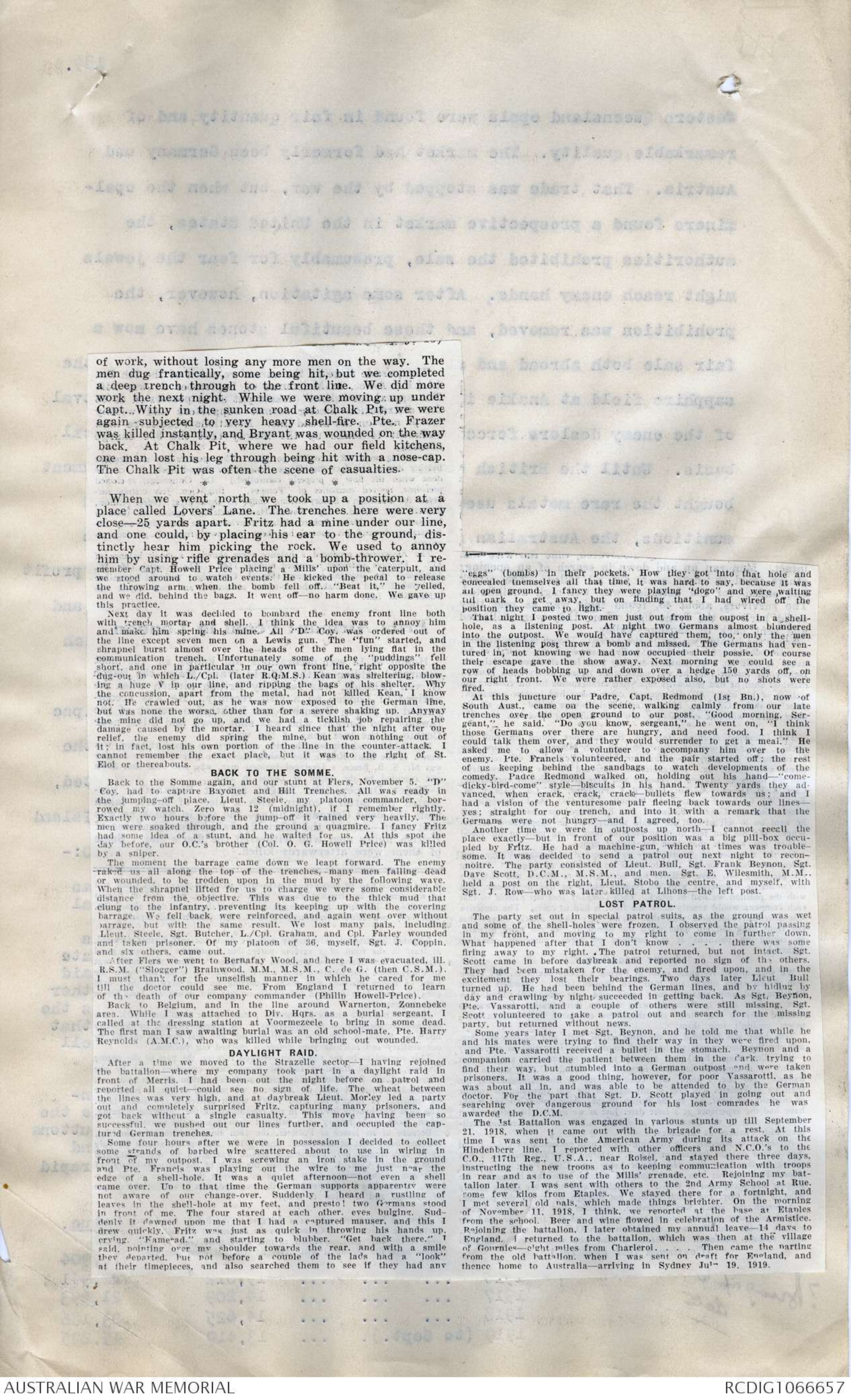
20/2/35
Dear Dr Bean,
I was promoted as under,-
L/Cpl, Feb 1916.
T/Cpl, 6-6-1916.
Cpl. 8-7-16.
T/Sgt, 6-8-16.
Sgt, 19-10-16.
T/C.S.M. - -9-17.
C.S.M. 12-10-17.
2/Lieut. 26-8-18.
Awarded the M.M. 15-7-16.
I took part in the first daylight raid, at Strazeele in May 1918, Sgt
Bruggy at 3am, raided a post about 550 yards distant, and killed 3 or 4
of the enemy,at 8am, as Bruggy had no details, I was instructed to go
and get some, Bruggy accompanied me, following the report 1 made to the
C.O.which appeared unbelievable, an Aeroplane was sent to photograph
my track, By 12 noon, the C.O. had the photo, which proved my report
correct, Bruggy was made a Lieut, and awarded the M.M. I was presented
with a copy, of the photograph.
I was mentioned in Divisional xorders
in company with my brother, Pte V. Kinchington, 3rd Bn, in May and June,
1918, for good work, I was also paraded before that gallent gentleman,
Col Howell-Price, twice, to be thanked for my work.
Yours faithfully,
P. Kinchington.
P.S. I had four other brothers with me, at the war.all in the Infantry.
TELEPHONE. FL. 4151
VOLUME IV
Page ........ (MS.)
COMMONWEALTH OF AUSTRALIA.
HISTORIAN.
VICTORIA BARRACKS.
PADDINGTON, N.S.W.
19 February 1935.
Dear Sir,
In the history of the A.I.F., now being written, it is
intended to show the dates and places of birth of all those
mentioned, and also to connect them with the town or district
to which they properly belong. It is also desired to indicate
the profession or calling followed by each person prior to the
outbreak of The War.
From the information in my possession the details in
connexion with yourself,
would be as follow:-
Born in (place ) ?? Roma, Q'Land. on (date) ?? 24-4-1894.
Belong to (town or district) Waverley, N.S.W.
Profession or calling ?? Elec ^tram Driver.
It would be appreciated if you would give me, at the earliest
possible date, any details which would assist in compiling this
information.
Yours faithfully,
C.EW Bean
C.E.W. Bean
ppas Historian.
P. Kinchington, Esq., M.M.,
"Chuignes",
Dunning Avenue,
Rosebery, N. S.W.
P.T.O.
Bruggy's Raid. 22/5/18
Kinchington's A/c. 8/2/37
Bruggy ws a big country man, 6'2" or so & square,
fairly well informed, & a favourite of Capt McDermid.
This morning Bruggy had had his rum -
K. thinks he had other ^men's rum as well. What made
him go out K. doesn't know; but he came
into the kitchen or back room of McD's HQ
at the Paradise xx Estaminet & threw
down five discs on the table. His revolver
was caked up with mud. He said practically
nothing xx McD., when B. had gone, asked
K. if he thought the discs were genuine or
had been taken from dead Germans in front
of the x lines - there were plenty. M. K. noticed
what looked like dew or rain stains on them
& so doubted them. Evidently Also they were of difft regts.
Kinchington sd to B. tt if he ws game eno' to
go out again K wd go with him. They went
out from / road & struck B's tracks - parting
/ crop carefully w their hands. They got behind / trench
(wh ws W. of the houses) & looked into it ^from behind & there
were the dead & wd Gs and (says K) another one
who had come in since & was shamming dead.
The far end o / post was covered with galv. iron
[*on posts & this man was sitting back agst it with his eyes shut.
K. put his hand on his shoulder strap to tear it off & the man hit him hard on the
arm so K shot him. K. traced the tracks of two who had crawled off thro the
hedge in rear - and then xx K & B returned.
Crops were later cut in front of the Posts by bayonets. When we took a
German post we had to cut the crops beyond its parados. We were once surprised by
Gs c/attg while
we were doing
so without
a listening
post.*]
Dear Dr Bean,
One day in June 1918, as I was wandering through the crops
in front of our line, near Nord Helf Wood, facing Meteren, I located an enemy
post, I related my find to Lieut Stuart, O.C. "C" Coy, Col Moore, was at coy
H'qrs at the time, and ordered the post to be taken, Lieut Col Smith, M.C. was
deputed for the job, at his invertation I assisted, we took the post, and as a
hedge ran right alongside of it, I advised Smith to dig a post at the other
side of the hedge, in order to protect himself, this was done and while we
were clearing a field of fire, the germans returned, and with bombs etc, killed
several , Col had not taken the precaution to place & couple of men out in
front, while the digging went on.
After a lively time we held our ground, later
a listening post of 2 men was placed some 25 yards out, Two or three nights la
later, as I was at the post, I observed a german coming down the hedge, the
men in the listening post had also seen him, they had an agreement, "when I
fire, you throw a bomb" they put this into effect, that, with the result, Under-
officer, V.F. Heinzer, Iron Cross, of the 52nd regiment, fell wounded in 43 places
he informed me that he knew the men were there, and that he had endeavoured to
capture them, I took his papers before he died, one of which, advised him to
be careful of the Australians, as they were dangerous fellows, and often went
about in the daytime, We buried him as a brave man should be buried.
Orders then came that this post which was troublesome to us, should be taken,
"C" Coy went to close reserve, & "B" Coy releived us, Lieut Smith was again with
his platoon given the job, when I informed him, he "said this is the finish for
me, send my things to England" sure enough, he Cpl Smith and Pte Smith, a1l of
No 9, platoon were amongst others killed, Lieut Loveday, who had just taken over
Smiths old position in the line, was then given the task, Loveday, was badly
wounded, & all his platoon failed, the affair was timed for 12 mid-night, I
went up to the mid post, which was almost in the line, the men did not know
what was going on, I went back, although it was none of my business, and told
Col Moore that things were not going too good, Col Moore knew that even if I
was making a mistake, it was to the best of my ability correct, & he could take
notice of me, he said "I will ring the Brigadier, Kinchington, he did so, & the
Brigadier, I think we still had Leslie, went off, for being wakened at 2am,
two more platoons, making 4 in all, were then detailed to attack the post, and
by 3am, it was ours.
I simply convey anything to you Dr, for information only.
Yours respectfully.
P. Kinchington.
P.S.
We took the first of these posts about June 21s,t the German
oficer was killed on 23rd, & Lt. Smith, a few days later
PK.
It was at Strazeele that the first daylight raid took place, Sgt. J Bruggy
went out before daylight, over 500 yards, entered a german post, killed several
men and returned, he had two or three identity discs, as they were of different
regiments, Capt McDermid, O.C. "C" Coy asked me what did I think of them?
It was now 8 am, there were plenty of german dead lying about, Capt McDermid,
desired some identification, I said to Bruggy, if you are game enough to go
out again, I will go with you, little did I think it was so far, we made our
way out entering the post from behind, and found two dead, two wounded in the
post, others had apparently got away wounded, as I trailed their tracks of
blood through two hedges, the german main line was only about 500 yards
distant, and it was several hours since these men were wounded, our position
was not the happiest, I collected all the papers, paybooks, etc. that I could,
we decided that it would be safer to leave, after our return at about 9am I
made a report, so astounding was it, that it was decided to sent an Aeroplane
to take a photograph of our tracks, which were plain as this print, the
photo was taken, printed and in the Colonels hands before 12 oclock.
[[*From Lt. P. Kinchington 3rd Bn*]]
13
June 1, 1934 REVEILLE
Memories of
Meteren
(By Lieut. P. Kinchington, M.M.,
3rd Bn., A.L.F.)
Photos - see original document
METEREN is a pretty village in Flanders, of which our
battalion—the 3rd—had many memories—some sad.
The village had a population of 3000, and is built on
a hill on the Cassel-Bailleul-Armentieres Road, about five
miles from the Belgian border. It had a fine church, and
on different roads running from the town were pretty
little shrines, which suggested the one time peace and
happiness of the locality.
The usual small farms abound, between some of which
on the western side of the village runs the Bocque du
Paradie, an important place to Meteren.
We were among the first Australians to make Meteren's
acquaintance. We arrived there on April 10, 1916. and
after a few days we knew every stone and tree about the
asked the C.S.M. what he thought of it. It was now 8 a.m.
place, as we marched for miles and miles every day.
On one occasion, wearied by incessant marching, Pte.
Dovey came on parade in full marching order, minus his
trousers—his underpants adorned with puttees. Upon
being called to fall out, before the assembled company
a favourite punishment of Capt. Harris—and after being
questioned as to where his trousers were, Dovey replied,
"Wet, sir."
"How did they get wet, Dovey?" asked Capt. Harris.
"Too much marching, sir," said Dovey. Captain Harris
and the whole parade, laughed. "Go off parade and dry
Your trousers, Dovey," said the O.C.—a command which,
of course, suited Dovey.
Another memory of Meteren was that outside our billet
in the fields. Here were graves of British soldier —
the first graves we saw in France. A number were in
the fields, adorned with flowering poppies, waving in the
breeze. There were nice crosses upon the graves,
inscribed "Unknown British Soldier." I took a photo of the
graves, and this I always treasure. To the very day,
two years later, our battalion assisted at the very billets
we had occupied in stemming the German break through
on the Lys, and we threw our posts across the fields
within 50 yards of the unknown soldiers' graves, which
were soon despoiled by gunfire.
In 1916 we were commanded by Col. Howell-Price,
who had guided our destinies since Lone Pine. The
battalion was now very strong, having been reorganised at
Several minor raids were undertaken. Lieut. Jackson, Cols
Tel-el-Kebir. Platoons were all over 70 strong, and were
trained to the minure; the large majority being new men, who
had not experienced gunfire, but were equal to all tests when
they came.
Generous leave—a feature of our battalion—was allowed,
and all adjoining villages were visited. After ten days at
Meteren the unit moved towards the line, in the Sailly Sur-
La-Lys sector, and did not return to Meteren for 21 months
when we again had four weeks’ spell; many of the troops
having the same billees as previously. Col. D. Moore now
commanded the battalion, and carried on the traditions of
Col. Howell- Price, who had been killed over a year before.
An enjoyable time was again spent; the Germans were
over 25 miles away. Little did we think that in eight weeks
time: the village would be in German hands, together with
half of our present billets.
After our spell, on February 26, 1918, we went toward
the line in the Ypres sector; our division—the 1st—being
the last of the Australians to occupy this area. Owing
to the German advance on the Somme, we followed our
sister divisions thither, to reinforce the sorely tried Fifth
British Army. We were not to join them, however, for
several months, as within an hour or so of arriving on
the Somme, we retraced our steps, for the Germans had
by then broken through in Flanders at the very polace
we had left several days previously. So that, on April
12—two years after our acquaintance with Meteren—we
again "dug in" in this area.
The crops were now about 3ft. high, so daylight raids
became the order. Sgt. Bruggy, one morning, went out
over 500 yards and killed several of the enemy in a post
and returned with some identity discs. Capt. McDermid
asked the C.S.M. what he thought of it. It was now 8 a.m.
The C.S.M. said to Bruggy, "If you are game enough
to go and show me the post, I am game enough to go
with you." Little did he think it was so far. They made
their way out, entering the post from behind, and found
two dead and two wounded in the post, while two others
had got away, as their trail of blood was seen through the
hedge.
After collecting the soldiers' papers, etc., it was decided to leave for
"health" reasons. After their return about 9 a.m. the C.S.M. made a
report, and so astounding was it that a 'plane when out to take a photo
of the tracks, which were as plain as this print. The phoot was developed
and printed and in the Colonel's hands before 12 o'clock. For their
exploits, Sgt Bruggy received a commission and M.M. The C.S.M.
received a copy of the aeroplane photo.
This was the commencement of the daylight raids, and one felt proud t
o be an Australian at the things that the Diggers did here. It was
nothing for them to take a stroll out and locate a post with a few Fritzes.
The president of the Grafton Sub-Branch, in company with the C.S.M.
located a post, and Col. Moore ordered it to be taken, which was done.
A second German post proving more troublesome to this one, Lieut. C.L. Smith,
M.C., was order to take the former. He was killed there as were many
of his platoon. Lieut. Loveday, M.C., was then detailed for the job, and
nearly all his men became casualties, he himself being badly wounded. Two
more platoons were then detailed, and after three hours the post was
ours.
We continued in this area for nearly four months—a division on our
own—every few days doing firing line, support, and reserve, and were
not out of shell range one day. It was a trying time. It was a Nord
Helf Wood that Capt. Higinbotham and Cp. N. Lee were killed.
Several minor raids were undertaken. Lieut. Jackson, Cpls.
Conmee and Green made on on "Gutzer Farm." All the bravery
was not on our side, as, early on June 26, a German under-
officer crept through the crop to take a listening post, attached
to one which Lieut. Smith had taken. A few yards away he
was seen, one man in the listening post saying to the other,
"When I fire, Bill, you throw a bomb. A Mills bomb is segmented
to break up into 46 pieces. When we brought the German
in, he had 46 wounds; so that, counting in the rifle
bullet, only one piece had missed him. He was only a young
fellow, already decorated with the Iron Cross. I have his photo.
He was a brave man, I buried him nearby. In his pocket
he had papers from his Commander warning him that the
Australians were dangerous fellows, and they even went about
in the day time.
On August 5, 1918, we left this area for all time, in order
to join our sister Divisions for the battle of Amiens on the 8th.
Photo - see original document
Lieut. Kinchington.
DEMOLITIONS, in Fifth Army, Somme bridges destroyed.
in Third Army, ; failure to destroy dumps
early enough, 245n
18
October 1, 1932 REVEILLE
On Active Service: A Sergeant's Reminiscences
(By Sgt. Norman H. ("Sammy") Langford, "D" Coy., 1st Bn.)
In this article I have trusted to memory only, so
I may not be always right in my references to localities
or to positions in the line held by the 1st
Battalion. My reason for venturing these
reminiscences is to spur on other former members to do
likewise, for the 1st Battalion did very good work
and possessed many fine officers and men who deserve
a niche in the glory of the A.l.F. I appeal to all
1st Battalion Diggers to join their association and
maintain the spirit and traditions of the old Battalion.
The fame of other units and of their personnel
has been chronicled in "Reveille" by various writers.
Let it not be said that the 1st Battalion lags behind.
AFTER our tiring train journey
from Marseilles, on the move
from Egypt to France, the lst Bn. occupied
billets at Wallon Cappel, just outside
Hazebrouck. After a period of
training in this area, my O.C. (the late
Major P. Howell-Price) included me in
a batch of officers and N.C.O.'s which
was sent to the front line for experience,
and to get a lay-out of the place.
We were taken up by a 'bus as far as it was safe to
go, and then walked the rest of the journey. Eventually
I was posted to the 8th Manchester Regt., and was well
received. This particular regt., known as the "Bantams,"
(I think the tallest man in it was not more than 5ft, 4in.)
was holding the line at Rue du Bois, which
was fairly quiet, unless one started stunting, when Fritz
would retaliate. While Sergeant Smith, of the "Bantams,"
was showing me around and explaining the use
of gas gongs, a "minenwerfer" landed fair on the duck-
boards in the trench. Two Tommies were killed outright
and some wounded. I did not hear the shell coming,
but I saw that all were looking upwards. I got a stiff
neck watching for others.
Eventually the 1st. Bn. relieved the "Bantams," and
my company was in supports, doing fatigue work and
ration carrying. On one occasion I was detailed with
my platoon to drain a communication trench called
"Pinney Avenue," just to the left of V.C. Avenue.
On one side of the trench there was a row of tall
trees which sort of concealed the trench from the air.
We had hardly started upon our work when Fritz spotted
us from his observation balloon. Quickly the shells came
over. My old pal, "Snowy" Bryant, and myself were
on top directing the work, and we had to dive for a
tree trunk. I hugged the tree and Bryant hugged me, as
shrapnel burst in the branches, sending limbs down.
Fritz seemed to have the range to a tee, and I ordered
the men back to some shelter trenches just in rear
One man, Pte. Shorty Frazer, got a shrapnel through
his foot—he was later killed at the Chalk Pit, Pozieres.
"Snow" and I turned to go, when we again heard the
boom of a shell. Just to my right there was a bit of bank, and I
saw a hole. and dived in. followed by Bryant, who had only got
half in when a 5.9 landed four feet short. The sandbags crumbled
with the explosion, and when we had time to look around we saw
to our horror that the hole was stacked with 120-1b. trench mortar
shells.
There is an old saying, "Look before you leap" but there is an
exception when shells are landing close. "Snowy" had one look and
was off—myself close upon his heels—and we got back to the rest
of the men in the safety trenches. Had that shell landed a foot
higher—well, we could have said, "Na poo!" And 1 think by the
size of the mortar shells, that the cemetery opposite would not have
needed our company. Just a little later on there was a "stand to"
gas alarm, 1 think. Somebody fired a flare, which was faulty, and
it landed upon headquarters, setting the place on fire.
After a rest, I was again sent to the forward area to report to
the 21st Lancaster Fusiliers—same N.C.O.'s as before. The Tommies
were holding the line at Fleurbaix, between Convent Avenue, Boutlllerie
Avenue, and Tin Barn Dump communication trenches, which became
well-known later to Diggers of the 54th Bn. in the Fromelles disaster.
We relieved the Lanc. and were in the line for some days. I was
in a bit of a "mix-up" while putting out wire, when some of our
own men mistook each other for Fritz.
Photo - see original document
Sgt. Langford
It happened this way: Lieut. McConnel
and Sgt. Dave Tarrant were the covering
party out in front, and took up a
position on the left of a road passing
through both ours and German trenches.
Lieut. Graham, of "C" Coy., went out
later with instructions to join McConnel’s
party on his right, the road dividing
the two patrols. I was working 30
yards in front of our trench when the
man helping me to fix the wire around
the stake poked me in the ribs, and said,
"Look!" Look I did. I stared, and in
front, slightly to the right, were some
crouching figures, moving towards us.
One of the men who had been placed
as an additional cover challenged, and
receiving no reply from the strangers,
who had now ducked down in the grass,
fired. The fire was returned. We threw
our bombs, and made a dash for our
trench. Luckily, most of the bombs failed to explode,
as in the excitement some of the men forgot to draw the
pins. Pte. Mountcastle was wounded by a bomb and
brought in, only to be killed in 1917 at Hill 60, by a
shell.
Strange to say, at this time Fritz had a patrol out
also, and when our fun started he bolted back to his
trench, only to be bombed in mistake by his side also.
Poor Lieut, McConnel—I did not envy him and his party
crouching out there between the two lines, whilst flares
lit up "No Man’s Land"; but McConnel's good leadership
and care got all back safely without a casualty.
Here also my O.C. (Philip Howell-Price) distinguished
himself in a raid, which was a great success. We lost
only one man killed—Sgt. Downer, who, I believe, was
shot from a dugout as he passed the opening. Howell-
Price was awarded the D.S.O. I will leave details of
this raid to some member who took part in it, in the
hope that he will tell in "Reveille" how it was carried
out. This gallant officer, who knew no fear, fell in
action, together with Lieut. Chas. Parry, at Broodseinde,
on October 4, 1917.
My next turn was at Pozieres for the second stunt—
I was in hospital during the first one. Capt. Bert Withy
was told to take some N.C.O's up to the front line to
get bearings, etc. I was one of them, others being Sgt.
Bryant and L./Cpl. McLeod. The 3rd and 4th Battalions
were in the line, and were being heavily shelled. We
left the reserve trenches and commenced to make our
way up, passing many unburied Kilties and Germans.
All this made one feel that he would like to hand in his
pay-book and call for an Aussie ticket.
We got into the communication trench—Centreway Avenue—and made
our way to 3rd Bn Hqrs., where hung a huge bell. The trench up
saw a hole. and dived in. followed by Bryant, who had only go:
to this stage was fairly deep, but thence onward to the front line
It was bad. Just in front of us. going around a traverse, was a party
of bombers, carrying water-cans. One shell landed among the eight
men, wiping them out—all except one, who was badly wounded. We
rushed forward and pulled the wounded man into a sitting position—
where the trench was a bit deeper. We ran on then, falling down as
near ones landed, showering earth over us.
On reaching the front line, we halted in a dug-out to get our
second wind. Then off on the return journey, running a gauntlet of
shells. We passed the wounded man again. Strange to say. he got
over it, and later he, and my pal. Sgt. Bryant, met in hospital,
while the latter was also under treatment for wounds.
Next night "D" Coy. was ordered to dig a new sap in the forward
area. Capt. Howell Price led us out and through the communication
trench. The night was pitch dark, and Fritz put down a heavy
barrage. We lay flat in the bottom of the trench, earth falling in
on us, and at last he killed Sgts. Wilson and Whitby with a 5.9.
It was a perfect hell. Howell Price decided that the best course
to adopt was to run through it. He shouted, " 'D' Coy., prepare to
move at the double." and we did. and reached the appointed place
(Continued on page 31)
175
regard to the supply of materials, the accumulation of stocks, and
the supply of labour, which must be greatly curtailed by the
recruiting movement. Even primary production was involved.
Australia was in ignorance as to how it should get its produce to
any possible market abroad, or where that market was to be, or
what price and in what manner it proposed to pay for the goods.
Comfort was indeed found in the fact that Australia was a great
producer of precisely those foodstuffs and raw materials of
industry which war not only could not dispense with, but which, by
preventing production in Europe, it would make still more valuable
to exporters from abroad. But even in the case of wool, wheat,
beef, and mutton, whether refrigerated or canned, butter and cheese,
rabbits, leather and hides, tallow, minerals and ores, timber,
wines, jams, and sugar, producers remained, during the first
months of the war, very uncertain as to what might happen to their
business. The pastoralists, for example, were told by their city
agents that there would be no sale for their wool, which they would
therefore do better to store on their stations until a market was
forthcoming. Such uncertainty reacted powerfully upon employment,
and although it is usual ^in any case for the Australian winter to be the slack
season for labour, the number of men in all the Commonwealth centres
who were out of work in August 1914 was abnormal.
There were also a number of minor, but in the aggregate still
important, groups of production which were immediately upset. Such
was the case with the mining centres yielding molybdenum and other
rare ores, the pearl fisheries and the gem fields, all of which were
in a large degree controlled by foreign agencies, who chiefly or
alone bought the product. Furthermore, as it became evident that
to a very great extent Australia would now be cut off from its
ordinary recourse to the London money market for public, semi-public,
and private financial operations, there set in a process of
restricting such expenditure as could be controlled, and the last
five months of the year 1914 were among the most difficult that
business men had ever experienced. [It is probable that the amount
of existing unemployment and the not unreasonable expectation of
of work, without losing any more men on the way. The
men dug frantically, some being hit, but we completed
a deep trench through to the front line. We did more
work the next night. While we were moving up under
Capt.. Withy in, the sunken road at Chalk, Pit, we were
again subjected to very heavy shell-fire. Pte. Frazer
was killed instantly, and Bryant was wounded on the way
back. At Chalk Pit, where we had our field kitchens,
one man lost his leg through being hit with a nose-cap.
The Chalk Pit was often the scene of casualties.
When we went north we took up a position at a
place called Lovers’ Lane. The trenches here were very
close—25 yards apart. Fritz had a mine under our line,
and one could, by placing his ear to the ground,
distinctly hear him picking the rock. We used to annoy
him by using rifle grenades and a bomb-thrower. I
remember Capt. Howell Price placing a Mills' upon the 'caterpult, and
we stood around to watch events: He kicked the pedal to release
the throwing arm when the bomb fell off. "Beat it," he yelled,
and we did, behind the bags. It went off—no harm done., We gave up
this practice.
Next day it was decided to bombard the enemy front line both
with trench mortar and shell. 1 think the idea was to annoy him
and make him spring his mine.- All "D" Coy, was ordered out
the line except seven men on a Lewis gun. The "fun" started, and
shrapnel burst almost over the heads of the men lying flat in the
communication trench. Unfortunately some of the "puddings" fell
short, and one in particular in our own front line, right opposite the
dug-out in which L./Cpl. (later R.Q.M.S.). Kean was sheltering, blowing
a huge V in our line, and ripping the bags of his shelter. Why
the concussion, apart from the metal, had not killed Kean, I know
not. He crawled out, as he was now exposed to the German line,
but was none the worse, other than for a severe shaking up. Anyway
the mine did not go up, and we had a ticklish job repairing the
damage caused by the mortar. I heard since that the night after our
relief, the enemy did spring the mine, but won nothing out of
it; in fact, lost his own portion of the line in the counter-attack. I
cannot remember the exact place, but it was to the right of St.
Elol or thereabouts.
BACK TO THE SOMME.
Back to the Somme again, and our stunt at Flers, November 5. "D"
Coy. had to capture Bayonet and Hill Trenches. All was ready in
the jumping-off place. Lieut. Steele, my platoon commander,
borrowed my watch. Zero was 12 (midnight), if I remember rightly.
Exactly two hours before the jump-off it rained very heavily. The
men were soaked through, and the ground a quagmire. I fancy Fritz
had some idea of a stunt, and he waited for us. At this spot the
day before, our O.C.'s brother (Col. O. G. Howell Price) was killed
by a sniper.
The moment the barrage came down we leapt forward. The enemy
raked us all along the top of the trenches,-many men falling dead
or wounded, to be trodden upon in the mud by the following wave.
When the shrapnel lifted for us to charge we were some considerable
distance from the objective. This was due to the thick mud that
clung to the infantry, preventing its keeping up with the covering
barrage. We fell back, were reinforced, and again went over without
barrage, but with the same result. We lost many pals. including
Lieut. Steele. Sgt. Butcher, L./Cpl. Graham, and Cpl. Farley wounded
and taken prisoner. Of my platoon of 36, myself, Sgt. J. Coppin.
and six others, came out.
After Flers we went to Bernafay Wood, and here I was evacuated, ill.
R.S.M. ("Slogger") Brainwood. M.M., M.S.M., C. de G. (then C.S.M.).
I must thank for the unselfish manner in which he cared for me
till the doctor could see me. From England I returned to learn
of the death of our company commander (Philip Howell-Price).
Back to Belgium, and in the line around Warnerton, Zonnebeke
area. While I was attached to Div. Hqrs. as a burial sergeant.
called at the dressing station at Voormezeele to bring in some dead
The first man I saw awaiting burial was an old school-mate, Pte. Harry
Rernolds (A.M.C.), who was killed while bringing out wounded.
DAVLIGHT RAID.
After a time we moved to the Strazelle sector—I having rejoined
the battalion—where my company took part in a daylight raid in
front of Merris. I had been out the night before on patrol and
reported all quiet—could see no sign of life. The wheat between
the lines was very high, and at daybreak Lieut. Morley led a party
out and completely surprised Fritz, capturing many prisoners, and
got back without a single casualty. This move having been so
successful, we pushed out our lines further, and occupied the
captured German trenches.
Some four hours after we were in possession I decided to collect
some strands of barbed wire scattered about to use in wiring in
front of my outpost. I was screwing an iron stake in the ground
and Pte. Francis was playing out the wire to me just near the
edge of a shell-hole. II was a quiet afternoon—not even a shell
came over. Up to that time the German supports apparently were
not aware of our change-over. Suddenly 1 heard a rustling of
leaves in the shell-hole at my feet, and presto! two Germans stood
in front of me. The four stared at each other, eyes bulging.
Suddenly it downed upon me that I had a captured mauser, and this I
drew quickly. Fritz was just as quick in throwing his hands up
crying "Kamerad." and starting to blubber. "Get back there," I
said, pointing over my shoulder towards the rear, and with a smile
they departed. But not before a couple of the lads had a "look"
at their timepleces, and also searched them to see If they had any
"eggs" (bombs) in their pockets. How they got into that hole and
concealed themselves all that time, it was hard to say, because it was
an open ground. I fancy they were playing "dogo" and were waiting
till dark to get away, but on finding that I had wired off the
position they came to light.
That night I posted two men just out from the oupost in a shell-
hole, as a listening post. At night two Germans almost blundered
into the outpost. We would have captured them, too, only the men
in the listening post threw a bomb and missed. The Germans had
ventured in, not knowing we had now occupied their possie. Of course
their escape gave the show away. Next morning we could see a
row of heads bobbing up and down over a hedge 150 yards off, on
our right front. We were rather exposed also, but no shots were
fired.
At this juncture our Padre, Capt. Redmond (1st Bn.), now of
South Aust., came on the scene, walking calmly from our late
trenches over the open ground to our post. "Good morning,
Sergeant," he said. "Do you know, sergeant," he went on, "I think
those Germans over there are hungry, and need food. I think
could talk them over, and they would surrender to get a meal." He
asked me to allow a volunteer to accompany him over to the
enemy. Pte. Francis volunteered, and the pair started off; the rest
of us keeping behind the sandbags to watch developments of the
comedy. Padre Redmond walked on, holding out his hand—"come-
dicky-bird-come" style—biscuits in his hand. Twenty yards they
advanced, when crack, crack, crack—bullets flew towards us; and I
had a vision of the venturesome pair fleeing back towards our lines—
yes; straight for our trench, and into it with a remark that the
Germans were not hungry—and I agreed, too.
Another time we were in outposts up north—I cannot recall the
place exactly—but in front of our position was a big pill-box
occupied by Fritz. He had a machine-gun, which at times was troublesome.
It was decided to send a patrol out next night to reconnoitre.
The party consisted of Lieut. Bull, Sgt. Frank Beynon, Sgt
Dave Scott, D.C.M., M.S.M., and men. Sgt. E. Wilesmith, M.M..
held a post on the right, Lieut. Stobo the centre, and myself, with
Sgt. J. Row—who was later killed at Lihons—the left post.
LOST PATROL.
The party set out in special patrol suits, as the ground was wet
and some of the shell-holes were frozen. I observed the patrol passing
in my front, and moving to my right to come in further down.
there was some
What happened after that I don't know .... there was some
firing away to my right. The patrol returned, but not intact. Sgt.
Scott came in before daybreak and reported no sign of the others.
They had been mistaken for the enemy, and fired upon, and in the
excitement they lost their bearings. Two days later Lleut Bull
turned up. He had been behind the German lines, and by hiding by
day and crawling by night succeeded in getting back. As Sgt. Beynon
Pte. Vassarottl, and a couple of others were still missing, Sgt.
Scott volunteered to take a patrol out and search for the missing
party, but returned without news.
Some years later I met Sgt. Beynon, and he told me that while he
and his mates were trying to find their way in they were fired upon.
and Pte. Vassarottl received a bullet in the stomach. Beynon and a
companion carried the patient between them in the dark. trying to
find their way, but stumbled into a German outpost and were taken
prisoners. It was a good thing, however, for poor Vassarottl, as he
was about all in, and was able to be attended to by the German
doctor. For the part that Sgt. D. Scott played in going out and
searching over dangerous ground for his lost comrades he was
awarded the D.C.M.
The 1st Battalion was engaged in various stunts up till September
21. 1918. when 4it came out with the brigade for a rest. At this
time I was sent to the American Army during its attack on the
Hindenberg line. I reported with other officers and N.C.O.s to the
C.O.. 117th Reg., U.S.A.. near Roisel, and stayed there three days
instructing the new troops as to keeping communication with troops
in rear and as to use of the Mills' grenade, etc. Rejoining my
battalion later, I was sent with others to the 2nd Army School at Rue..
some few kilos from Etaples. We staved there for a fortnight, and
met several old pals, which made things brighter. On the morning
November 11. 1918, 1 think, we reported at the base at Etaples
from the school. Beer and wine flowed in celebration of the Armistice.
Rejoining the battalion, I later obtained my annual leave— 14 days to
England. I returned to the battalion, which was then at the village
of Gournies—eight miles from Charlerol.... Then came the parting
from the old battalion, when I was sent on draft for England, and
thence home to Australia—arriving in Sydney July 19. 1919.
 Jasmine Hatharasinghe
Jasmine HatharasingheThis transcription item is now locked to you for editing. To release the lock either Save your changes or Cancel.
This lock will be automatically released after 60 minutes of inactivity.